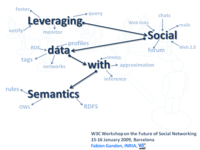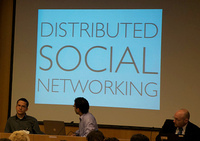Hosted by
Universitat Politècnica de Catalunya and
ReadyPeople
Silver Sponsors
(also available in PDf format)
W3C organized a workshop on the Future of Social Networking in January 2009, hosted in Barcelona by Universitat Politècnica de Catalunya and ReadyPeople, in order to bring together industry actors to foster discussion, analyze risks and opportunities of social networking industry, and define plans for the future of the industry, including opportunities of creation of a W3C group to continue the discussion. 72 position papers were submitted for the Workshop and 57 organizations were represented at the event: telecom operators, social network operators, handset manufacturers, service providers, researchers, start-ups, etc.
Table of Contents
Summary
The participants in the W3C Workshop on the Future of Social Networking discussed the current state of the social networking industry and, in this context, examined the following topics:
- the nature of less centralized and more distributed social networks architectures, including their design and possible business and technical challenges associated with distributed social networking,
- the increase of contextual information associated with social networking users, its use and possible abuse,
- the impact of context as well as existing lack of policies within networks on user privacy risks and the establishment of a Web of trust, and
- the tendency for existing social networking platforms to exclude those potential users with disabilities or constrained devices (e.g., mobile).
The participants drew the following conclusions and felt that actions by the community are warranted:
| Conclusions | Action |
|---|---|
| Given the growing number and maturity of data interoperability formats and protocols, there is a significant opportunity for social networks to reduce the detrimental effects of architectural silos by opening their closed communities for the benefit of users. Totally distributed social networking is a possible future scenario. | A W3C Incubator Group will review and map the data interoperability technologies available, including technologies developed outside the W3C, to identify potential gaps and illustrate how to use these technologies together, supported by an open source implementation of a decentralized architecture. |
| There is a significant risk level and a lack of awareness among users surrounding the risks associated with social networking activity and social media publishing. | Work on privacy best practices, both for users and providers, and further interaction with the existing W3C Policy Languages Interest Group, will continue the discussions on the preservation of privacy. |
| Context is playing a large and increasingly important role in the social networking industry. Context has many elements and sources which at this time are poorly understood and managed (by users or the providers of social networks). | The existing W3C work on deepening the integration of sensors and user contexts in the Web will be fed by specific use cases and requirements of social networks providers, as part of an incubator group. |
| Many future business opportunities are (or will soon be) stifled by the lack of a convention and/or widely adopted protocol for the exchange of value for goods and services within communities. | The revival of past work or initiation of new work on a micropayments protocol, seen as an important enabler for the social networking industry, will be explored as part of an incubator group. |
| There is need for specific outreach on social network feature/service accessibility and mobility matters to address the disparity between current implementations of social networks and the devices or capabilities of all users of the Web. | The relevant W3C groups will be informed of the need for specific outreach on accessibility and mobility matters for social networking. |
Introduction
Social networking is a complex, large and rapidly expanding sector of the information economy. The impacts of emerging social networking tools will be far-reaching. For example, user-generated content is causing changes in the traditional content/media industry structure. In the future, community features could be an integral part of all digital experiences - from information/publishing to business and entertainment.
Companies providing services for social media and social networking, or adding social networking features to existing services, must anticipate and begin working to resolve barriers to industry growth and stability. W3C organized a workshop to gather the various actors of this industry to discuss the challenges they'll need to face together to allow for healthy market expansion in the future.
Among the 72 position papers submitted for consideration, the Program Committee identified the following topics as prominent subjects for discussion:
- the push for a decentralized architecture for social networks, where data could be more freely moved in the Social Web;
- the question around sustainable business models for social networks, in particular in a decentralized model, and how they could inform technical decisions;
- the challenges and opportunities that social networks bring to the ecosystem in terms of privacy risks and Web of trust;
- the transformative affects that new devices, new sensors and a greater integration of these as data sources within the social networking environment have with respect to informing third party services about user context; and
- the special needs that people with disabilities and those using mobile devices have which, once met, will make social networks more broadly inclusive.
Decentralized Architecture for Social Networks and Data Portability

Credit: Fabien Gandon
Roughly half of the papers submitted for consideration at the workshop treated the topic of decentralizing social networks, arguing that forcing users to create accounts and record their data across many of these networks was counter-productive, and prevented the establishment of innovative services.
A decentralized architecture for social networks would allow the user to choose how many accounts and profiles she desires, and to use any of these on any social networks which would support the proposed or user-selected features.
There was consensus at the workshop that most, if not all, of the technologies needed to create decentralized social networks already exist: FOAF, RDFa, XFN and other microformats, SIOC and Portable Contacts were mentioned for data formats, and OpenID, OAuth, XMPP for interaction protocols. A couple of social data aggregation services were presented, based on FOAF, OpenID and client-side SSL certificates.
In particular, there were strong pleas not to create any new format or protocol in that area unless a gap in the stack is formally identified. The difficulty of sharing users' assets (i.e. the user generated content posted on a given social network) across social networks was mentioned as a potential area where further work would be beneficial.
Participants agreed upon two parallel approaches worth of pursuit in order to better inform the future discussions on decentralizing social networks:
- a review and mapping of existing formats and protocols done as part of a proposed Social Web Incubator Group (draft charter),
- collaboration on an open source demonstration of such a decentralized social network, in particular fed by the work Henry Story demonstrated on using FOAF+SSL to that end, possibly completed with OpenID.
Business Models considerations
The workshop participants considered the general question of sustainable business models for social networks as a way to detect possible obstacles to the maturation of the social networking industry, and with the goal of identifying possible opportunities for collaboration among actors (social network operators, service providers, telecommunication operators, etc.) on solving these issues.
Obviously, many different business models have been successfully deployed in social networks, including, among others:
- subscription fees for end-users - although that option was noted as often difficult to set up,
- advertising,
- broker for communities sharing similar interests,
- access to premium content or services.
There isn't a single sustainable business model, and there are probably still many new business models that will be invented based on the new value that social networks bring, i.e. the increased communication channels between trusted or similar-minded people. In particular, the potential business value communities provide by reducing the cost of establishing trust between agents seem to open the way for a lot of innovative markets.
One technical gap that might be preventing some of these business models to flourish was identified as the lack of micropayments protocol on the Web; while there was some early work on such a protocol in W3C in 1997 that was inconclusive, some of the participants felt that the ecosystem has sufficiently changed in the past ten years to justify trying to restart discussions toward the establishment of such a protocol, and are planning to set up a dedicated W3C Incubator Group to work on these questions.
The specific role of the network operators, especially in the context of social networks on mobile devices, was debated, but the comparison of the value they can bring to social networks as identity managers and transaction brokers to the cost of global and network-neutral deployment of social networks did not lead to specific progress.
The workshop participants also investigated the particular case of whether decentralized social networks could be sustainable, and in particular if decentralization had any chance of being adopted by the existing major players in the market. The following arguments to support opening existing social networks were brought up:
- it would allow the existing social networks to go "beyond the firewall", i.e. in environments where the boundaries of information sharing needs to be strictly defined and enforced, e.g. inside a company;
- easing the transfer of data and assets across social networks increase the liquidity of the overall market, and creates a much bigger market for everyone to play in.
In general, the workshop participants agreed it was important to consider these discussions on business practices as input to the technical work, but did not see the W3C playing a specific role in establishing these discussions beyond the workshop.
Privacy and Trust

Credit: Karl Dubost
A number of the position papers submitted to the workshop highlighted the existing and upcoming privacy challenges that social networks create.
The participants strongly agreed that social networking technologies needed to preserve the possibility for a user to fragment its identity across various profiles, and, in an increasingly context-sensitive setting, to hide, blur or lie about the user's current context, as a minimal option to protect privacy.
Some of the presentations highlighted technical solutions to establish trust and privacy boundaries among social networks participants, even in a decentralized architecture. But the difficulty of getting users to recognize the privacy-implications of their behavior on social networks, and to understand and define access control policies around these behaviors was found to stand as a great obstacle to the deployment of any technical solution. As a potential way forward, some participants expressed interest in creating guidelines and tutorials targeted at social network users.
Some of the discussions evoked the possibility of creating a code of ethics or privacy best practices targeted at social network operators, but many people warned that the difference among legislation, cultures, and usage context (business relations, intranet, family connections) would make that exercise difficult if at all possible.
Exploratory work on both of these topics is under consideration in a
proposed Social
Networking Best Practices Incubator Group that could either stand on its
own or be a task force of a larger Incubator Group around social networking.
Those interested in pursuing this effort are invited to contact Christine
Perey <cperey@perey.com>. and Renato Iannella <renato@nicta.com.au>.
On more technical grounds, two potential work items were identified that could help decrease the privacy-related risks in social networks:
- an extension of P3P that would fit the new kind of user activities facilitated by social networks, in particular through the sharing of user generated content; that proposal will be brought to the Policy Languages Interest Group (PLING), along with a summary of the privacy-related discussions of the workshop;
- an ontology to describe access control policies that could help setting up finegrained sharing policies in a decentralized social networking architecture; there is some existing work in this area, and discussions on whether any of this ontology work needs to happen in W3C (e.g. as part of W3C Submission Process) will start in the foaf-protocols mailing list, driven by Alexandre Passant.
Context Sensitivity
The combination of the rise of social networking among mobile device users (as illustrated e.g. by Opera's State of Mobile Web reports) with the increasing number of sensors on these devices (cameras, GPS, microphones, accelerometers, etc.) is opening up a number of possibilities to integrate deeply the social networking user experience within its user context, in particular in terms of places, time and people.
A number of social networks already take advantage of geolocation, and some even are purely based on the communities created around sharing some specific contextual data. A number of position papers and presentations explored how additional contextual information could bring value to social networks, although some standardization efforts would be needed to make it possible to exploit this information with minimal technical investments. The existing work in the W3C Geolocation Working Group, the W3C Ubiquitous Web Applications Working Group, the W3C Web Applications Working Group, and the OMTP BONDI were mentioned as a way to bring more of this context to social networking. Some participants expressed interest in documenting use cases and requirements as seen from the social networking perspective, for possible input to this standardization work. A draft charter to start that work in an Incubator Group will be developed, led by Sam Critchley (GyPSii) and Manel Medina (Universitat Politecnica de Catalunya).
There were concerns on the privacy implications of sharing even more personal and contextual information on the network, with mentions of specific decoupling of the gathered data (e.g. time decoupled from location, or personal identity decoupled from location) as a way to reduce some of the induced risks. These considerations will be included in the feedback to the Policy Languages Interest Group, and in the potential work on best practices and guidelines.
Beyond the means of accessing a growing number of sensors and personal data from social networks, two specific work items are under consideration to make it easier to share data about the user context across social networks:
- an ontology of user context relative to the user rather than absolute: this would include terms to annotate a location as "home" and "office" rather than as a postal address or a geolocation, or a time as "workday" or "commuting time" rather than "Monday" or "8am"; that work could either be taken up by the Ubiquitous Web Applications Working Group as part of their work on personalization and the Delivery Context Ontology, or through a first exploratory work in an Incubator Group - Claudio Venezia (Telecom Italia) will be pursuing this lead;
- an ontology denoting that something is part of or contains an other thing (also known as mereology) that would be needed to describe many types of contextual information - e.g. that the user desk is a given subpart of her office, etc. Henry Story (SUN) will bring that topic for discussions to the W3C OWL Working Group.
Adapted User Experiences
A number of position papers touched on the need for social networking sites to create better adapted user experiences: in particular, to the growing market of mobile devices, whose hardware and networking constraints often require some specific adjustments, as well as to the communities of persons with disabilities in the large sense (e.g. including aging populations).
One of the presentations highlighted the needs of mobile social networking users to get more integration of features on their devices, while keeping a consistent look and feel across devices. The mobile environment also presents challenges linked to the deeper involvement of mobile network operators with their user base, raising specific questions on their roles vis-à-vis the rest of the ecosystem.
Another presenter focused on how social networking would be a priori a great opportunity for people with disabilities to increase their social interactions that can often be negatively impacted by their disability, but at the same time frequently ends up isolating them even more due to the lack of accessibility of many popular social networking sites, due to heavy use of CAPTCHA, the lack of annotations brought with user generated content, and the use of javascript in an inaccessible fashion.
On both of these aspects, existing W3C works were mentioned: the Mobile Web Best Practices and their upcoming successor the Mobile Web Application Best Practices already provide guidance on creating content and applications adapted to mobile devices; the Web Content Accessibility Guidelines 2.0 (WCAG2) and the Authoring Tool Accessibility Guidelines (ATAG) offer advice on creating accessible content, while the WAI-ARIA work in progress offers great opportunities for creating complex Web applications with better accessibility and usability. While none of these works are specific to social networks, none of the participants seemed to think that they would require specific guidance either.
The workshop attendees thus recommend that the relevant W3C groups - the WAI Education & Outreach Working Group and the Mobile Web Initiative Steering Council - increase their outreach specifically towards social networks operators, since they represent a particular opportunity and challenge for both accessibility and mobility.
Next steps
The workshop participants identified the following concrete next steps to be taken up as follow-up:
- creation of a Social Web Interoperability Incubator
Group (or a taskforce in a larger Social Web Incubator Group) to
review and map existing data formats and protocols used for
interoperability among social networks, identify potential gaps, and interact with the Open Web Foundation, the DiSo Project, and DataPortability.org; work
on a draft
charter has already started and is led by Harry Halpin
<hhalpin@ibiblio.org>(University of Edinburgh); - coordination of an open source demonstration of a decentralized
social network architecture, inspired by the FOAF+SSL and FOAF+OpenID proposals, led by
Henry Story
<Henry.Story@Sun.COM>(SUN Microsystems); - creation of a MicroPayments Incubator Group to explore
the opportunity of restarting work on a micropayments protocol in W3C to
facilitate the business development of social networks, led by Tim
Anglade
<tpa@af83.com>(AF83); - creation of Social Web Best Practices Incubator Group
(or a taskforce in a larger Social Web Incubator Group) to explore the
opportunity to develop privacy guidelines for social networks operators,
and privacy tutorials for social networks users; work on a draft
charter has already started and is led by Christine Perey
<cperey@perey.com>(Perey Research & Consulting); - informing the W3C Policy Languages Interest Group (PLING) of the findings of the workshop participants in terms of privacy risks in social networks, and of the possible need for a P3P extension more adapted to the emergence of new user interactions in social networking;
- exploring the opportunity to standardize an access control
ontology to facilitate the establishment of privacy boundaries
in a distributed social networking environment, led by Alexandre Passant
<alexandre.passant@deri.org>(DERI); - development of use cases and requirements for new context sensors and accessors based on the social networks perspective, in an Incubator Group, led by Sam Critchley (GyPSii) and Manel Medina (Universitat Politecnica de Catalunya);
- development of a user context ontology to allow interoperability across social networks in descriptions of a user situation ("home" / "office", "commuting" / "working", etc.), either as part of an Incubator Group or in the existing W3C Ubiquitous Web Applications Working Group; Claudio Venezia (Telecom Italia) is leading that effort;
- feedback to the W3C OWL Working
Group of the needs around mereology to depict
accurately the user context - led by Henry Story
<Henry.Story@Sun.COM>(SUN Microsystems); - feedback to the WAI Education & Outreach Working Group and the Mobile Web Initiative Steering Council of the importance of increasing outreach on accessibility and mobility needs targeted specifically at social networks - led by Henny Swan (Opera) and Dominique Hazaël-Massieux (W3C)
Based on the output of these various actions, another workshop on that topic could be planned in the future - in which case the participants strongly encouraged to hold it on the West Coast of the United States to get representation from other industry actors.





